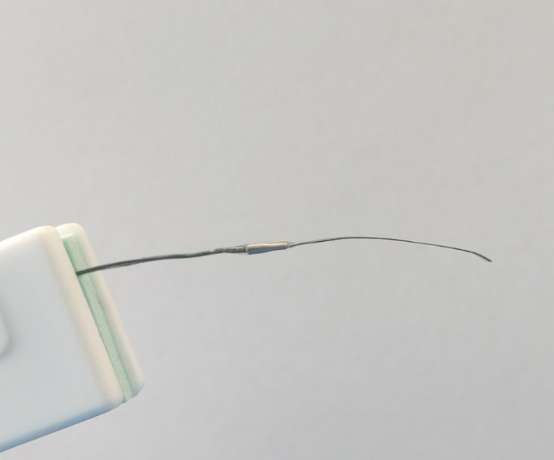
Processing Your Payment
Please do not leave this page until complete. This can take a few moments.
MaineHealth awards $100K for development of innovative medical devices
 Courtesy / MaineHealth
The collapsible aerosolized particle enclosure team is seen here testing the prototype in the Maine Medical Center Emergency Department in March 2020.
Courtesy / MaineHealth
The collapsible aerosolized particle enclosure team is seen here testing the prototype in the Maine Medical Center Emergency Department in March 2020.
A $100,000 investment from MaineHealth Innovation’s inaugural Bonfire Fund will fund development of two devices that may change future patient care: a robotic clot retriever and a collapsible aerosolized particle enclosure.
The innovations were designed by two groups of MaineHealth care team members. The groups will split the inaugural fund to advance their innovations, according to a news release.
The robotic clot retriever is designed to improve the way neurosurgeons clear blood clots from brains.
The collapsible enclosures are portable negative pressure isolation tents designed to fit over patient beds to help contain infectious particles.
Internal innovations
MaineHealth Innovation is a program of MaineHealth, the health care network headquartered in Portland.
Established in 2020, the MaineHealth Innovation Center works to accelerate creative solutions to solve today’s complex health care challenges, according to the organization’s website. Innovations are defined as new care team models, novel processes or services, or new products to address unmet care needs.
The MaineHealth Innovation Center established the MaineHealth Innovation Fund as an internal funding mechanism. There are two funding levels:
• The Ignite Fund provides seed capital up to $20,000.
• The Bonfire Fund provides an investment of up to $100,000. The goal is to support an advanced novel solution to a point where additional external or institutional funding opportunities can be explored from collaborators like Maine Technology Institute, Small Business Innovation Research or department or service line investments.
Recipients are companies founded by MaineHealth care team members and are chosen by a multi-disciplinary group of reviewers from across MaineHealth and its strategic partners. Innovations are judged on whether they provide a novel solution to unmet care needs that can be scaled to benefit the larger community.
“The Bonfire Fund is far more than just a monetary investment in our innovators,” Susan Ahern, MaineHealth’s vice president of innovation, said in the release. “Fund recipients benefit from connections to experts both within MaineHealth and in the larger community that can help them overcome technical or business challenges.”
Clot retriever
The clot retriever is designed to improve on the current best practice neurosurgical tools for stroke intervention, which relies on direct radiographic imaging and manipulation of catheter-based devices by the hand of the surgeon. The success rate of these procedures on a first attempt ranges from 30% to 80%, often requiring the surgeon to start the procedure several times.
MaineHealth neurosurgeons Robert Ecker and Jeffrey Florman teamed up with Mohshen Shahinpoor of the University of Maine to refine the approach by creating a “smart” robotic clot retriever. The team is aiming to design a steerable retriever using ionic polymer metal composites, which are unique electric “smart” materials that can function like human muscle and could provide surgeons with the full range of motion needed to more accurately retrieve clots.

The team filed a patent with MaineHealth in 2016 and received initial funding from medical device company Medtronic to develop an early prototype. In the fall of 2020, the team received funds from the MaineHealth Innovation Ignite Fund to refine the prototype.
Now the team is working with life sciences development company Looma Design in Saco and with a soft robotics engineer from Worchester Polytechnic Institute in Worcester, Mass., to create a medical-grade prototype for use in animal testing.
“The Bonfire Fund will allow us to further progress our prototyping towards a device that will be a first in human trial,” Ecker said.
Collapsible enclosure
In busy hospital emergency department filled with patients, many of whom have or may have COVID-19, the need to contain the spread of germs has become more important than ever, according to a separate news release.
The collapsible aerosolized particle enclosure innovation was the idea of two emergency medicine chief residents at Maine Medical Center, Liz Hamilton and Katie Main, who were looking for a way to isolate COVID patients as they were waiting to be admitted to a negative-pressure room.
As experienced campers, they brought their idea of creating a tent-like structure for hospital beds to attending physician Samir Haydar, who encouraged them to develop it. MaineHealth Innovation connected the team with Thermoformed Plastics of New England in Biddeford and Baker Co. in Sanford, which made significant improvements to their early prototype made from plastic and PVC pipe.
In early 2021 and with the assistance of MaineHealth Innovation, the team presented at a special “innovation showcase” demonstration for more than a dozen senior clinical and administrative leaders to gain additional user discovery insights and feedback.
Shortly after, the team secured funding from the Ignite Fund to scale production and marketing. Now the team is focused on obtaining regulatory approval for the device’s use in hospital and field clinic settings.
Now, the team plans to use its Bonfire Fund investment to obtain emergency use authorization from the U.S. Food and Drug Administration and plan a clinical trial.
“The Bonfire Fund is going to make all the difference,” Haydar said. “Our collaborative group has the expertise, but without these seed funds, this project just wouldn’t have been able to move on to the next level of development.”
Both Bonfire Fund recipients previously received $20,000 seed grants through MaineHealth Innovation’s Ignite Fund, which began in 2020.
Ignite Fund recipients
In addition to the $100,000 in Bonfire Fund investments, MaineHealth made $20,000 Ignite Fund investments in four innovations by care team members:
• Bethany Sweet, a child life specialist at Barbara Bush Children’s Hospital at Maine Medical Center, is designing a fully functioning replicated port-a-catheter called “Play Portal” to help pediatric patients prepare for the procedure through play.
• Theresa Roelke, a nurse practitioner at Maine Medical Center, is developing a 3D educational tool called a “Pocket Nodule-Lung” that providers can use to explain to patients the size and type of lung nodules that may be found during a lung screening.
• Will Connolly, an emergency medicine nurse at Maine Medical Center, is designing a compact, cost-effective suction device called “Rescue Vac” to clear a patient's airway in situations where more sophisticated suction devices are not easily accessible.
• Sunil Malhotra, a cardiothoracic surgeon and medical director at Maine Medical Center, is developing a graft to better direct blood flow in patients with single ventricle congenital heart disease.
“Innovation is one of MaineHealth’s six values and an integral part of its mission of caring for our community, educating tomorrow’s caregivers and researching new ways to provide care,” said Doug Sawyer, MaineHealth’s chief academic officer and interim chief medical officer. “These funds are one way we help foster a culture of innovation throughout our organization in keeping with our vision of working together so our communities are the healthiest in America.”
MaineHealth plans to continue its Innovation Fund investments with another round of applications in 2022.














0 Comments